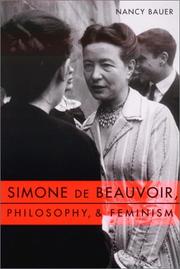| Listing 1 - 3 of 3 |
Sort by
|

ISBN: 9780231529174 9780231116640 0231529171 0231529171 Year: 2001 Publisher: New York, NY : Columbia University Press,
Abstract | Keywords | Export | Availability | Bookmark
 Loading...
Loading...Choose an application
- Reference Manager
- EndNote
- RefWorks (Direct export to RefWorks)
In the introduction to The Second Sex, Simone de Beauvoir notes that "a man never begins by establishing himself as an individual of a certain sex: his being a man poses no problem." Nancy Bauer begins her book by asking: "Then what kind of a problem does being a woman pose?" Bauer's aim is to show that in answering this question The Second Sex dramatizes the extent to which being a woman poses a philosophical problem. This book is a call for philosophers as well as feminists to turn, or return to, The Second Sex. Bauer shows that Beauvoir's magnum opus, written a quarter-century before the development of contemporary feminist philosophy, constitutes a meditation on the relationship between women and philosophy that remains profoundly undervalued. She argues that the extraordinary effect The Second Sex has had on women's lives, then and now, can be traced to Beauvoir's discovery of a new way to philosophize-a way grounded in her identity as a woman. In offering a new interpretation of The Second Sex, Bauer shows how philosophy can be politically productive for women while remaining genuinely philosophical.
Philosophy --- Feminism. --- Feminist theory. --- Beauvoir, Simone de,
Multi
ISBN: 9781009026802 9781009011785 Year: 2022 Publisher: Cambridge Cambridge University Press
Abstract | Keywords | Export | Availability | Bookmark
 Loading...
Loading...Choose an application
- Reference Manager
- EndNote
- RefWorks (Direct export to RefWorks)
Tracing her intellectual development from her university years, when she was trained in a Cartesian and neo-Kantian philosophical tradition, to her final decade, during which she was recognised as having inspired the emerging strands of late twentieth-century feminism, Beauvoir is shown to have been among the most influential philosophical voices of the mid twentieth century. Countering the recent trend to read her in isolation from Sartre, she is shown to have both adopted, adapted, and influenced his philosophy, most importantly through encouraging him to engage with Hegel and to consider our relations with others. The Second Sex is read in the light of her existentialist humanism and ultimately faulted for having succumbed too uncritically to the masculine myth that it is men who are solely responsible for society's intellectual and cultural history.
Philosophers --- Beauvoir, Simone de, --- de Beauvoir, Simone, --- de Beauvoir, Simone --- Beauvoir, Simone de --- Beauvoir, S. de --- De Beauvoir, Simone --- Bofuwa, Ximengna de --- Bōvōwāru, Shimōnu do --- Bovuar, Simona de --- Būfwār, Sīmūn Dū --- De Bofuwa, Ximengna --- Po-wa, Hsi-meng --- Castor --- Beauvoir, de, Simone
Multi
ISBN: 9781474444125 9781474418874 9781474418881 9781474418898 1474418880 1474418872 1474438598 1474418899 1474444121 Year: 2017 Publisher: Edinburgh: Edinburgh University Press,
Abstract | Keywords | Export | Availability | Bookmark
 Loading...
Loading...Choose an application
- Reference Manager
- EndNote
- RefWorks (Direct export to RefWorks)
Laura Hengehold presents a new, Deleuzian reading of Simone de Beauvoir's phenomenology, the place of recognition in The Second Sex, the philosophical issues in her novels and the important role of her student diaries. Most studies of Simone de Beauvoir situate her with respect to Hegel and the tradition of 20th-century phenomenology begun by Husserl and Heidegger, and often stress the importance of Hegel's struggle for recognition. Hengehold, in comparison, reads de Beauvoir through a Deleuzian lens, and looks at de Beauvoir's early interest in Bergson and Leibniz. Hengehold clarifies the elements of Deleuze's thought - alone and in collaboration with Guattari - that may be most useful to contemporary feminists who are simultaneously rethinking the becoming of gender and the becoming of philosophy.
Philosophical anthropology --- Beauvoir, de, Simone --- Individuation (Philosophy) --- Feminist theory --- Sexism --- Philosophy --- Beauvoir, Simone de, --- Deleuze, Gilles, --- Criticism and interpretation --- Feminism --- Feminism. --- Individuals (Philosophy) --- Individuation --- Particulars (Philosophy) --- Haecceity (Philosophy) --- Emancipation of women --- Feminist movement --- Women --- Women's lib --- Women's liberation --- Women's liberation movement --- Women's movement --- Social movements --- Anti-feminism --- Emancipation --- de Beauvoir, Simone, --- de Beauvoir, Simone --- Beauvoir, Simone de --- Beauvoir, S. de --- De Beauvoir, Simone --- Bofuwa, Ximengna de --- Bōvōwāru, Shimōnu do --- Bovuar, Simona de --- Būfwār, Sīmūn Dū --- De Bofuwa, Ximengna --- Po-wa, Hsi-meng --- Castor --- Criticism and interpretation. --- Beauvoir, Simone de, - 1908-1986 --- Beauvoir, Simone de, - 1908-1986. - Deuxième sexe --- Deleuze, Gilles, - 1925-1995
| Listing 1 - 3 of 3 |
Sort by
|

 Search
Search Feedback
Feedback About UniCat
About UniCat  Help
Help News
News